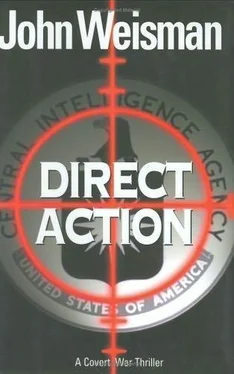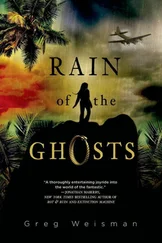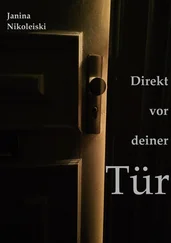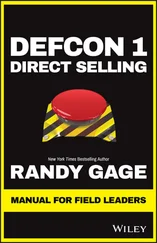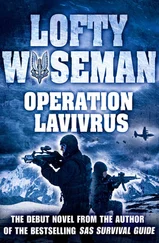Tom had always been told knowledge was power. If that was true, and given all he knew right now, why did he feel as helpless as a drowning man?
6:35P.M. Tom looked around Reuven’s garden, the Bouviers stretched out, snoring, at his feet, the lanterns providing soft light as dusk settled over Herzlyia. He felt a lot better and guessed that the surroundings had a lot to do with the fact that his earlier spasm of panic and helplessness had largely subsided. Reuven’s housekeeper had set out a huge earthenware bowl of fresh figs for them. Reuven had augmented the fragrant fruit with a large slab of Morbier and a chunk of saucisson de Lyon sec on a white Limoges platter.
Now the Israeli emerged from the kitchen and made his way down the marble steps carrying a 1960s-vintage Chemex and a round cork trivet. He set the trivet on the table and poured Nescafé into three mugs emblazoned with the CIA seal.
Three mugs because Tom and Reuven weren’t alone. They’d been joined by a third man. Amos Aricha was a former assistant director of Shin Bet. Aricha was a lifelong counterterrorist who had commanded the agency’s selected targeting task force. His job: arresting or eliminating the individuals who built the explosive vests and car bombs and the masterminds who dispatched homicide bombers against Israeli civilians. These days, he said, he was a partner in a private company that trained security personnel and did risk assessments. He gave Tom his business card. On it was engraved a bird of prey in flight. Below, in Hebrew, was his old task force’s motto, adapted from the old American TV show Hill Street Blues . It read, Let’s Do It to Them Before They Do It to Us.
But doing it to them was becoming more and more difficult, what with the media’s bias against Israel and the pressure to wage politically correct warfare against enemies who didn’t give a damn about humane rules of engagement. “I feel like a whatchamacallit sal-o-mon swimming upstream.” Aricha dropped heavily onto a chair. “And believe me, kiddo, I seen sal-o-mon. I’ve done my share of white-water rafting all around your wild, wild west.”
Amos had gone through basic training with Reuven. They’d both served in Sayeret Mat’kal, and after active duty they’d done their meluim 17in the same unit. Which meant the two men had known each other virtually since they’d been teenagers. Tom sneaked a look at the interaction between the Israelis. Their easy relationship-the inside jokes, the back-and-forth bantering, the way they dealt with each other-made him envious. He was a Foreign Service brat. He’d grown up in seven different countries and had attended sixteen different schools before he’d settled down at Dartmouth for four straight years in the same place.
Afterward, at CIA, he’d resumed his peripatetic lifestyle with three- and four-year tours. He hadn’t ever lived in one place long enough to make the sorts of friends one keeps for a lifetime. Until he’d returned to Paris.
Aricha reached across the table for the small earthenware pitcher of milk and poured some into his coffee. He was, Tom had to admit, an unlikely-looking manhunter. A big-boned man in his late sixties with a shock of curly white hair tied back into a 1960s-style ponytail, Aricha wore faded Levi’s cinched by a tooled rodeo belt with a silver-and-turquoise buckle the size of a horseshoe, topped by a matching denim shirt whose mother-of-pearl-topped snaps were open halfway down his hairy chest. His sleeves were rolled up past the elbows to display muscular, suntanned arms and a gold Rolex on his left wrist. The ragged cuffs of his jeans fell onto scuffed brown sharkskin Tony Lama cowboy boots. All he lacked, Tom thought, was the Colt Peacemaker on his hip and the tin star on his chest.
“My boy,” Aricha said to Tom in thickly accented English, “you have what we call balagan gadol -a big problem-and so do we.”
It all made such perfect sense in hindsight. On the way back from the prison, Tom had called his office and had one of his people check on whether there had been multiple sales of Vuitton Montsouris backpacks in August 2003. It took less than two hours for the results to come in from Paris. Malik and Dianne had met with his “editor” on Saturday, August 15. On Monday the eighteenth, twelve Vuitton backpacks-the entire stock in Vuitton’s Champs-Élysées store-had been ordered by telephone. A commercial messenger had picked them up, paying in cash. There was no record of where they’d been delivered.
But there was a signature from the messenger on the receipt. Using the secure phone at Reuven’s office, Tom had called one of 4627’s Parisian gumshoes and had him wash the name through the police computer. By four o’clock Tel Aviv time, the private investigator had the name of the messenger service and verified the delivery address: Boissons Maghreb. By 4:30, 4627’s Paris office had used one of its technical employees to set up a phone tap and begun the slightly more intricate arrangements to intercept Yahia Hamzi’s cell-phone transmissions. There was no jumping through hoops to satisfy a station chief, no waiting for ambassadorial approval, no back-and-forth with Langley.
More to the point, Tom understood there’d been no explosives in the radio Dianne Lamb had brought from London at Malik’s request. Malik had carried the bomb. Tariq Ben Said had somehow incorporated the plastique into the lining of the Vuitton backpack and done it in a way that still allowed the explosive to have the same lethal effect as a shaped charge.
God, how sophisticated things had become. When Tom had gone through case officer training in the 1980s, IEDs were relatively simple. You had your pipe bombs. You had your car bombs. You had your Molotov cocktails. You had your basic explosives: PETN, RDX, dynamite, or plastique-C3, C4, or Semtex. There were homemade mortars (the IRA favored those) and there were the occasional remotely detonated devices used by the ETA Basque separatists against the Spanish. But they were the exceptions to the rule.
Nope. In the 1980s, IEDs were all pretty basic, keep-it-simple-stupid bombs. Tom, for example, had been taught to make a cone charge powerful enough to blast through three inches of armor plate using a wine bottle and a one-pound block of C4. Today, he’d need less than a quarter of that amount. Today, it was all miniature devices and remote control. Explosives were now so concentrated that you could build a bomb powerful enough to bring down a 747 and conceal it in a tennis shoe. You could set off an IED planted in a car on a street in Haifa by making a cell-phone call from a café on the rue du Midi in Brussels. And you could-if you were Tariq Ben Said-create a totally unidentifiable bomb capable of killing sixteen and wounding scores more by transmogrifying the lining of a Louis Vuitton backpack into a weapon of mass destruction. The stuff was frigging invisible. Malik Suleiman had carried the goddamn backpack right past the baggage inspectors at de Gaulle and subsequently slipped it through Israel’s vaunted security systems. What would happen when he brought it throughU.S. airports, whose ineffective TSA (Transportation Security Administration) personnel were known derogatorily as “thousands standing around”?
Tom popped a chunk of sausage into his mouth. “Which brings me to point number two. Why did Malik ask Dianne Lamb to bring his radio in her suitcase? After all, the explosives were in the backpack.”
“There was a radio involved in the Jerusalem explosion.” Aricha sipped his coffee. “So there’s got to be a reason.” He set the mug on the table. “But let me tell you, I still talk to Shin Bet. And their forensics people have been over the goddamn thing top to whatchamacallit bottom. They haven’t found anything. There were never any explosives concealed in either one of the radios.”
Читать дальше
